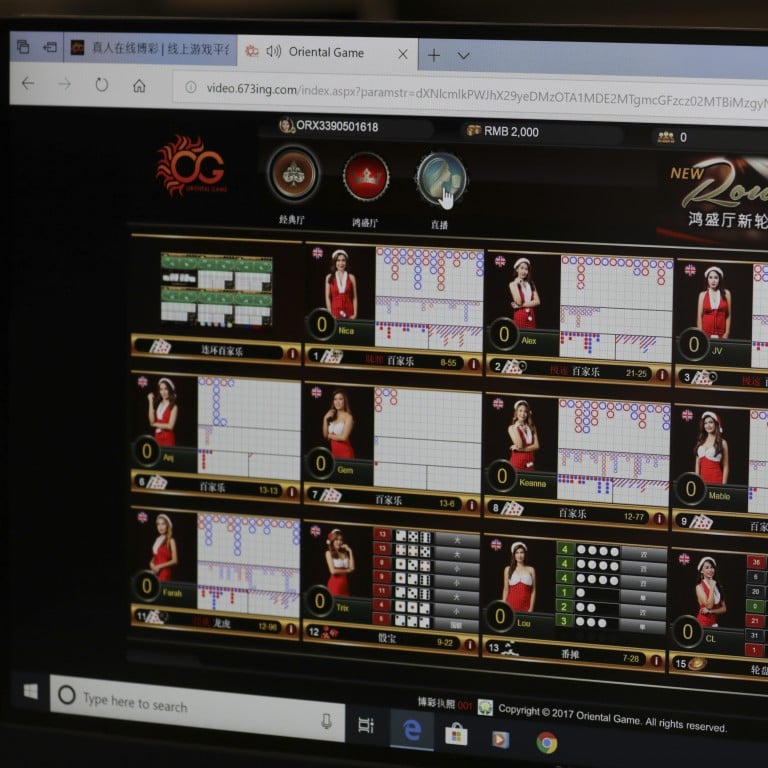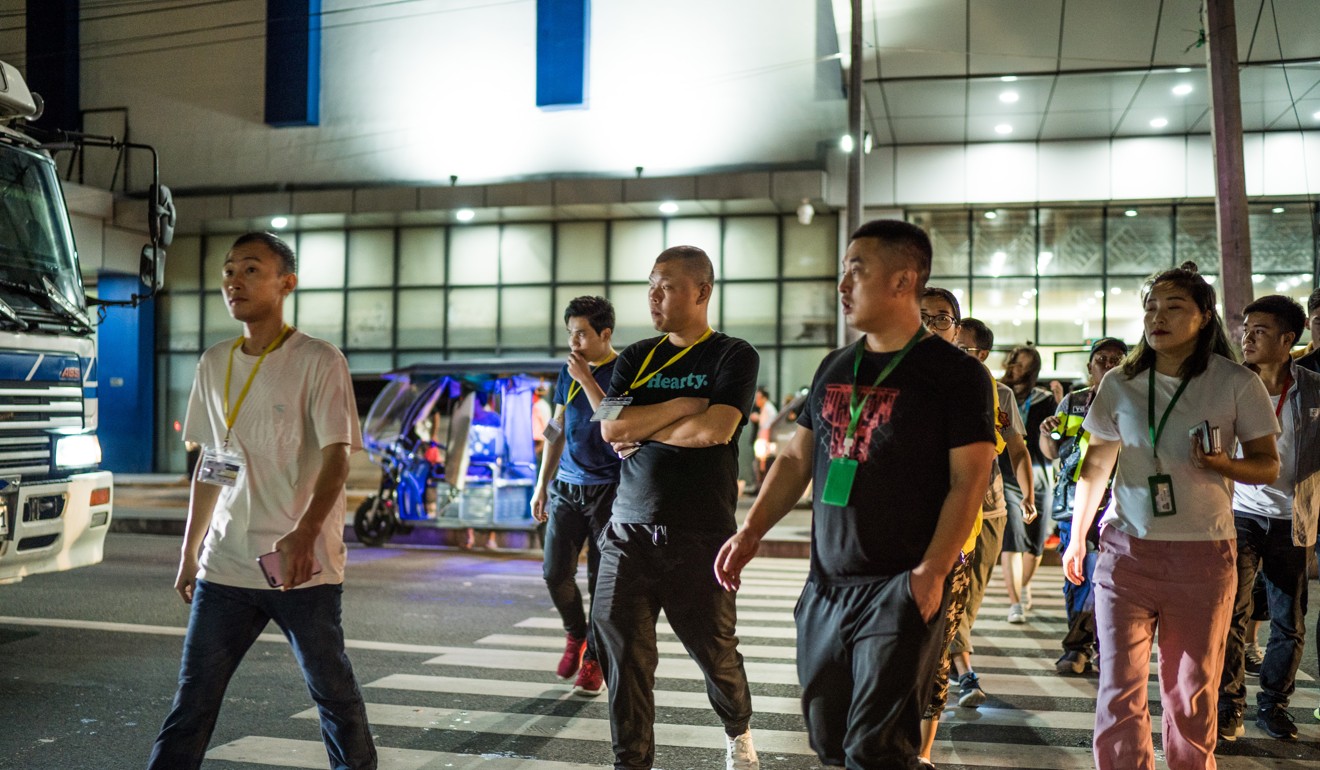
A Chinese crime wave hits Duterte’s Philippines as Pogos grow unchecked
- An upswing in licences for offshore gaming firms has seen the Philippines become a ‘haven for Chinese criminals and criminal syndicates’
- With 67 gambling-related kidnappings since 2017, why is the Duterte administration having trouble cracking down on the situation?
On the night of December 9 in Manila’s posh Makati district, a woman was pulled screaming into a van, which zoomed away in view of shocked witnesses. Police later identified the victim as Zhou Mei, from China – and the kidnappers were fellow nationals, making the case the latest in a long string of abductions involving and perpetrated by mainland Chinese.
The Philippines is becoming a haven for Chinese criminals and criminal syndicates
Philippines arrests 342 Chinese workers in online gaming crackdown
There have been 67 gambling-related kidnappings since 2017, with nearly all the victims Chinese, according to the Philippine National Police Anti-kidnapping Group (PNP AKG). Ang-See, however, said the figure was much higher than that. “Before, it was once a month, twice a month, then it became once a week, twice a week. [Now] it’s two to three cases involving Chinese everyday in Metro Manila.”
Typically, the victims are targets of scams, enticed to come to the Philippines and gamble in casinos, or they are Pogo employees. They are often loaned money to gamble, with the lender taking a cut of the winnings. Should the players lose the stake, they are abducted and released only when relatives pay a ransom.

Many rescued victims refuse to cooperate with authorities. Zhou Mei, the woman snatched in Makati, was a Pogo employee who surfaced after a few days but declined to talk to the police.
China holds the cards as online betting booms in the Philippines
Philippine authorities face three big issues when it comes to dealing with related crimes: dozens if not hundreds of underground Pogos that sprout overnight and operate without permits, generating zero revenue for the government; a rise in undocumented workers from China; and a weak, uncoordinated response from government agencies.
To begin with, nobody knows for sure just how many Pogos there are. In a hearing held by the congressional committee on games and amusements earlier this month, Pagcor said there were 72 licensed Pogos, 49 of which were “operational”. The Bureau of Internal Revenue (BIR) said only 10 of the 49 were paying franchise taxes.
Business analyst Rey Gamboa from The Philippine Star newspaper last month wrote that although Pagcor claims to have earned billions from Pogos in the past two years, the Philippines’ Department of Finance has said “many Pogo licence holders were not remitting the income taxes of employees … the BIR estimated lost revenues in billions of pesos.”

Last month, congressman Joey Salceda claimed there were at least 100 Pogos operating illegally, while in October the Philippine Daily Inquirer reported that the government had this year shut down nearly 200 illegal gambling operations.
Four weeks ago, Duterte told all Pogos to get accredited and pay their taxes, otherwise he would shoot them with a pellet gun. “I’m giving you at least three days, that’s good enough,” he said.
But nothing seems to have changed. Despite the government’s efforts, Pogos apparently have the ability to appear anywhere.
“These guys will come in, find a broker, lease a place, set up and operate without a permit,” said senator Sherwin Gatchalian, vice chair of the senate committee on economic affairs, to the South China Morning Post.
Philippine police save kidnapped Chinese man in 53rd case of casino-related abductions
“I know that for a fact because my family business is in an office in Pasig [City] and I noticed the number of Pogos in the building was increasing. Then two months ago, the BIR raided the building and deported almost 300 Chinese. [The gaming firms] were just operating there without any permit – and they were occupying five or seven floors.”
When teams from the police, Pagcor, BIR and Bureau of Immigration raid and close down Pogos, they also round up scores of illegal Chinese workers. Hundreds have been arrested this year, sent to holding camps – and then deported, with the help of Chinese police, on chartered aircraft.
Not helping the situation is the “visa upon arrival” programme initiated a few years back by the previous tourism secretary Wanda Teo. The programme makes it simple for Chinese nationals to enter the Philippines, then vanish and end up working for Pogos.
Ang-See from the Movement for the Restoration of Peace and Order said these illegal workers were packed into condominiums, with one unit having up to 40 people working in two or three shifts.
“The visa upon arrival is a really big loophole,” said senator Gatchalian. “We need to cancel that procedure and go back to the old way where they apply in our Philippine embassy [in China] and there is vetting.”
The senator also said the system made it easy for Chinese criminals to enter and leave the country, pointing out that those committing crimes in the Philippines “didn’t come here and become syndicates, they were syndicates from the beginning”.
The government has also issued contrasting figures on the total number of Chinese nationals working in the country. In a December 5 congressional hearing, the BIR pegged the figure at 44,798, the Department of Labour and Employment at 71,532 and Pagcor’s figure was 93,697.
Beijing slams Manila for undermining its cross-border gambling crackdown
However, estimates by real estate company Leechiu Property Consultants, based on the floor space taken up by Pogos, puts the number of Chinese workers in the Philippines at 400,000 to 800,000. The estimate was brought up in a congressional hearing, and the government has yet to respond to this figure.
Ang-See said she did not think the Leechiu estimate was that high, adding that she would “safely” say it was around 300,000 people. She added that the key to cut down on crimes involving Chinese nationals was to implement stricter immigration rules, stop issuing Pogo licences and crack down on illegal gambling.
Ang-See said the new Chinese ambassador to Manila, Huang Xilin, told her: “China is ready to crack down on Pogos, it’s the Philippines that’s not ready.”
She agreed, saying Philippine government was not willing to confront the issues with Pogos: “I think it’s turning a blind eye.”

